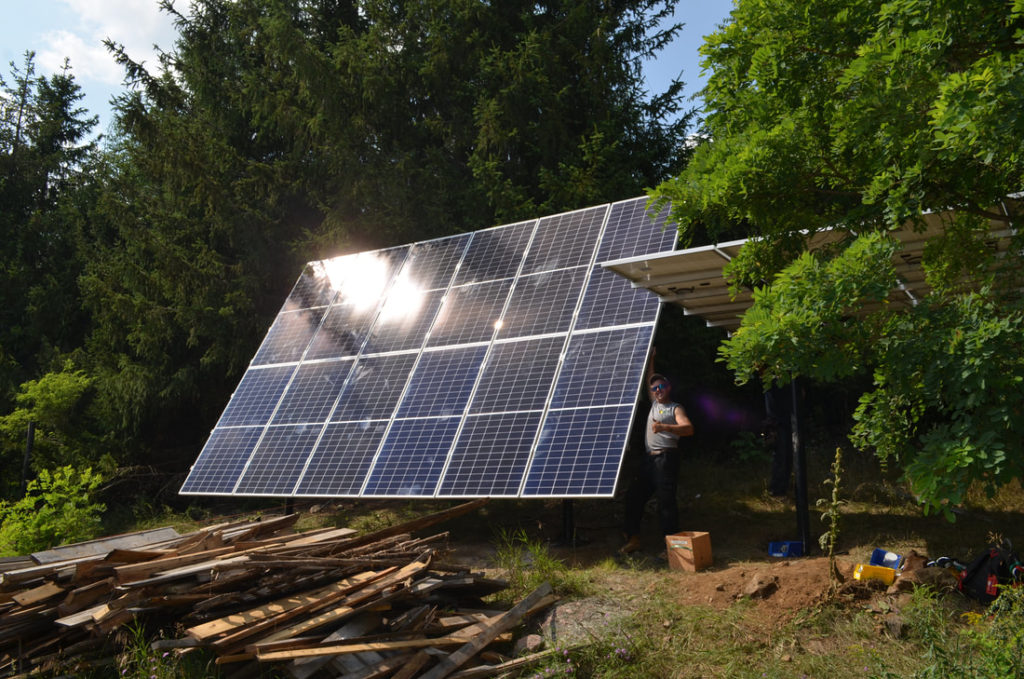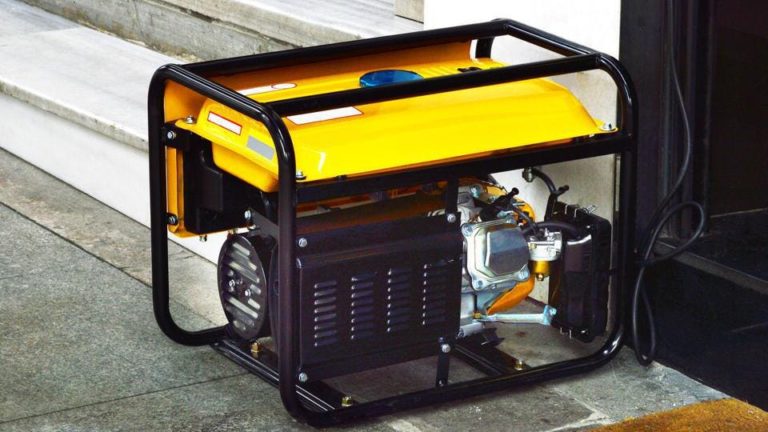Living remotely, away from the hustle and bustle of city life, can be a dream come true for many.
However, providing power and energy to these isolated homes or cabins can be a challenge.
From solar and wind power to hydroelectricity and biomass systems, each option has its own unique advantages and disadvantages.
We will explore the top off-grid energy options for remote living, including their pros and cons, installation costs, maintenance requirements, and more.
Whether you’re looking to build a new off-grid home or simply wanting to transition your existing one to a more sustainable energy source, this guide is here to help you make an informed decision that suits your lifestyle and budget best.
Solar Energy
Solar energy is one of the most popular and practical off-grid energy options for remote living. Solar panels can be installed on your roof or in a sunny area of your property to generate electricity, providing a reliable and sustainable source of power.
Solar panels can be installed on your roof or in a sunny area of your property to generate electricity, providing a reliable and sustainable source of power.
With the assistance of advanced technology and monitoring systems, it is possible to maximize energy production and minimize waste.
Furthermore, solar panels require little maintenance and can last for over 25 years, making them an excellent investment for your remote living needs.
Solar energy can be stored and used during periods of low sunlight or even at night through the use of battery banks.
This ensures that you have a reliable source of power, even when the sun is not shining.
The use of solar energy also offers a significant reduction in carbon emissions and reliance on non-renewable energy sources, making it a more environmentally friendly option.
Overall, solar energy is an excellent choice for those seeking off-grid energy options for their remote living needs.
Wind Energy
Wind energy is another popular off-grid energy option for remote living. A wind turbine can be installed on a hill or high point on your property to capture the wind and generate electricity.
Wind energy is a popular choice for remote living off-grid energy systems, as it is a clean and renewable source of power.
Installing a wind turbine on a hill or high point on your property can capture the wind and generate electricity, providing a reliable and sustainable source of power for your home.
When choosing a wind turbine, it’s important to consider the wind speeds and directions at your location, as well as the noise and visual impact of the turbine on your surroundings.
Properly sized and installed, a wind turbine can provide a significant portion of your home’s energy needs, reducing your reliance on fossil fuels and lowering your carbon footprint.
Many wind turbine manufacturers offer grid-tie systems that allow you to feed any excess energy back into the grid, providing a potential source of income and further reducing your energy costs.
Overall, wind energy is a reliable and sustainable off-grid energy option for remote living, offering a clean and renewable source of power for your home.
Hydro Energy
If you have access to a stream, river, or pond, hydro energy can be a great option for off-grid living. A small hydroelectric system can be installed to generate electricity from the movement of water.
Hydro energy is a highly versatile and sustainable option for off-grid living, providing a reliable source of electricity for powering your home and other appliances.
If you have access to a stream, river, or pond, you can harness the energy of moving water to generate electricity through a small hydroelectric system.
These systems typically consist of a turbine and generator, which convert the kinetic energy of the water into electrical energy.
The turbine is placed in the water flow, and as the water moves over the blades, it causes the turbine to spin, which in turn causes the generator to produce electricity.
Off-grid hydro energy options range from small, DIY-friendly systems to larger, commercial-grade installations.
For example, a small-scale hydropower system can be installed in a stream or creek, providing a steady supply of electricity for powering lights, appliances, and other essential systems.
Alternatively, a larger system can be installed in a river or pond, providing a more significant amount of electricity for powering larger appliances and machinery.
In addition to providing a reliable source of electricity, hydro energy systems also offer several other benefits.
They are highly sustainable, as they use a renewable resource (water) to generate electricity.
They are also relatively low maintenance, as they are designed to be self-sufficient and can run continuously for long periods without intervention.
Furthermore, hydro energy systems can help to reduce your reliance on the grid and decrease your carbon footprint, making them an excellent choice for those looking to live off the grid.
Overall, hydro energy is a highly viable and sustainable option for off-grid living.
With the right equipment and a reliable source of water, you can generate a steady supply of electricity while minimizing your impact on the environment.
One of the most exciting and rapidly developing technologies for off grid energy options is hydro energy.
As the name suggests, hydro energy uses the movement of water to generate power.
This makes it one of the most promising renewable energy sources that can help you power your home and life sustainably.
From small hydroelectric turbines that can provide electricity for lighting and appliances to large systems that can power entire communities, hydro energy offers a wide range of possibilities.
The beauty of hydro energy is its accessibility – you don’t need to be near a wind farm or a sunny spot to harness the power of nature.
Hydro energy can be generated from the flow of water in a river, stream, or even a pond, which means that many people have the potential to generate their own hydroelectric power, making them less reliant on the grid and more self-sufficient in the process.
So, if you’re looking for an environmentally-friendly and sustainable way to power your home or business, it’s worth exploring what hydro energy options are available in your area.
With the right technology and expertise, hydro energy can be a great option for those looking to go off the grid and live sustainably.
While many people may not be aware of it, hydro energy can be a great option for those looking to power their homes and lives sustainably.
With the potential to generate electricity from the movement of water in a stream, river, or pond, hydro energy can be a highly accessible source of renewable energy.
Unlike other forms of renewable energy, such as wind or solar, which require specific geographical locations and conditions, hydro energy can be generated from almost any source of moving water, making it an incredibly versatile and reliable option.
Not only can hydro energy be used to power homes and businesses, but it can also be used for irrigation, pumping water, and other industrial applications.
1.
2.
Durability: Hydro energy systems are relatively simple and have few moving parts, making them highly durable and able to last for decades with proper maintenance.
Environmentally Friendly: Hydro energy is a clean and renewable source of power that produces no emissions or pollution.
5.
Customization: With hydro energy, there is great potential for customization.
Systems can be scaled up or down depending on the needs of the user, and a wide range of turbine types and generator configurations are available to fit different water sources and energy requirements.
Hydro energy is just one of the many off grid energy options available to those seeking a sustainable and independent lifestyle.
1.
2.
3.
4.
Bioenergy: Bioenergy systems use organic matter such as wood, crops, or waste to produce electricity or heat.
Hydrogen Fuel Cells: Hydrogen fuel cells use hydrogen as a fuel source to produce electricity, providing a clean and efficient source of power.
1.
2.
3.
4.
Reduced environmental impact: Many off grid energy options, such as solar and wind power, have a reduced environmental impact compared to traditional grid energy sources.
5.
Improved energy security: Off grid energy systems can provide a more reliable source of power, especially during power outages or natural disasters.
It is important to keep in mind that hydro energy, bioenergy, and hydrogen fuel cells are all viable off grid energy options that can be considered.
When evaluating these options, it’s essential to consider the feasibility of the project based on location, resources, and budget.
Hydro energy requires a flowing water source, while bioenergy needs a steady supply of organic matter, and hydrogen fuel cells require a reliable source of hydrogen.
These systems also need proper maintenance to ensure optimal performance.
The benefits of these systems include reduced reliance on the grid, cost savings, increased energy independence, reduced environmental impact, and improved energy security.
Many renewable energy technologies are becoming increasingly efficient and affordable, making them more accessible to a wider range of consumers.
Off grid energy systems require careful planning, design, and implementation to ensure they are operating at peak performance, meeting energy demands, and providing long-term cost savings.
Biomass Energy
Biomass energy is generated from organic matter such as wood chips, agricultural waste, or even food waste. A biomass system can be installed to burn these materials and generate electricity, providing a sustainable and renewable source of power.
Biomass energy is a sustainable and renewable source of power that utilizes organic matter such as wood chips, agricultural waste, or even food waste to generate electricity.
A biomass system can be installed to burn these materials and produce electricity, offering an alternative to traditional fossil fuels.
The benefits of biomass energy are numerous, including its ability to reduce greenhouse gas emissions and reliance on non-renewable resources.
Biomass energy can be generated on-site, providing a self-sufficient and off-grid energy option for homes, farms, and businesses.
In fact, off-grid energy options such as biomass energy systems are becoming increasingly popular, particularly among those seeking to reduce their carbon footprint and reliance on the grid.
By harnessing the energy potential of organic matter, biomass energy provides a sustainable and renewable source of power that can help to reduce our reliance on fossil fuels and mitigate the impacts of climate change.
Geothermal Energy
Geothermal energy is generated from the heat of the Earth. A geothermal system can be installed to harness this heat and generate electricity, providing a reliable and sustainable source of power.
Geothermal energy is a highly reliable and sustainable source of power that utilizes the natural heat of the Earth to generate electricity.
Unlike other renewable energy sources that rely on weather conditions, geothermal energy is consistent and available 24/7, providing a stable and reliable source of power.
This energy is generated from the heat of the Earth, which is harnessed through a geothermal system that consists of a heat exchanger, a power turbine, and a generator.
The heat exchanger extracts heat from underground water or rocks, which is then used to power the turbine and generate electricity.
One of the main advantages of geothermal energy is its low environmental impact.
Unlike fossil fuels, geothermal energy does not produce greenhouse gas emissions, making it a clean and sustainable source of power.
Geothermal systems can be designed to use waste heat from other industrial processes, such as mining or agriculture, providing an additional source of energy and reducing waste.
Off-grid energy options, such as solar and wind power, can also be used in conjunction with geothermal energy to provide a reliable and sustainable source of power for remote or off-grid locations.
Biofuels
Biofuels are fuels made from organic matter such as plant material or waste oil. A biofuels system can be installed to convert these materials into fuel, providing a sustainable and renewable source of power.
Biofuels are a revolutionary alternative to traditional fossil fuels, made from organic matter such as plant material or waste oil.
By harnessing the power of these renewable resources, a biofuels system can be installed to convert these materials into clean-burning fuel, providing a sustainable and renewable source of power.
Unlike traditional fossil fuels, biofuels produce little to no emissions, making them an ideal choice for those looking to reduce their carbon footprint and transition to a more eco-friendly lifestyle.
Using biofuels can help reduce dependence on foreign oil and support local agriculture, creating a more self-sufficient and resilient community.
Off grid energy options such as solar panels and wind turbines can also be used in conjunction with a biofuels system to provide a comprehensive and sustainable energy solution.
Overall, investing in a biofuels system is a smart decision for those looking to reduce their impact on the environment and secure a more reliable source of power for their homes and businesses.
Tidal Energy
Tidal energy is generated from the movement of tides. A tidal system can be installed in a coastal area to harness the power of the tides and generate electricity, providing a reliable and sustainable source of power.
Tidal energy is a highly reliable and sustainable source of power that can be harnessed through the installation of a tidal system in a coastal area.
The system utilizes the constant and predictable movement of tides to generate electricity, providing a stable and renewable source of energy.
Tidal energy systems typically involve a series of underwater turbines or barrages that capture the kinetic energy of the tides and convert it into electricity.
The power generated from tidal energy is highly predictable and can be scheduled to meet the energy demands of a community or industrial operation.
Off-grid energy systems that incorporate tidal energy can be particularly beneficial for coastal communities that are located in areas with high tidal ranges and strong tidal currents, as they can provide a reliable source of power that is not dependent on the grid.
Tidal energy systems can be designed to include energy storage capabilities, further enhancing their ability to provide a stable and reliable source of power.
Overall, tidal energy is a highly promising off-grid energy option that can help communities reduce their reliance on fossil fuels and transition towards a more sustainable energy future.
Micro-Hydro Energy
Micro-hydro energy is generated from the movement of water. A micro-hydro system can be installed in a small stream or river to harness the power of the water and generate electricity, providing a sustainable and renewable source of power.
Micro-hydro energy is a highly efficient and sustainable way to generate electricity from the movement of water.
This off-grid energy option harnesses the power of small streams or rivers to produce clean and renewable electricity.
Unlike traditional hydroelectric power plants, micro-hydro systems are smaller in scale and can be easily installed in rural areas where access to electricity is limited.
The installation process typically involves building a dam or intake structure to regulate the flow of water and direct it towards a turbine.
The turbine is connected to a generator, which converts the kinetic energy of the water into electrical energy that can be distributed to nearby homes, businesses, or communities.
Micro-hydro energy is an excellent option for communities that have access to a small stream or river, but may not have the infrastructure to support traditional energy sources.
With no burning of fossil fuels or emission of greenhouse gases, micro-hydro energy is a clean and sustainable solution for powering off-grid communities.
The system requires minimal maintenance and can last for decades with proper care, making it a reliable and cost-effective source of energy.
Moreover, micro-hydro energy can also provide an opportunity for community-based renewable energy projects.
By collaborating with neighbors and local organizations, communities can pool their resources and install a micro-hydro system that benefits the entire community.
This not only reduces the energy costs for each individual but also helps to promote sustainability and energy independence.
Overall, micro-hydro energy is an excellent off-grid energy option that can help communities power their lives while preserving the environment.
Want More? Dive Deeper Here!
Hey there! If you’re the type who loves going down the rabbit hole of information (like we do), you’re in the right spot. We’ve pulled together some cool reads and resources that dive a bit deeper into the stuff we chat about on our site. Whether you’re just killing time or super into the topic, these picks might just be what you’re looking for. Happy reading!






